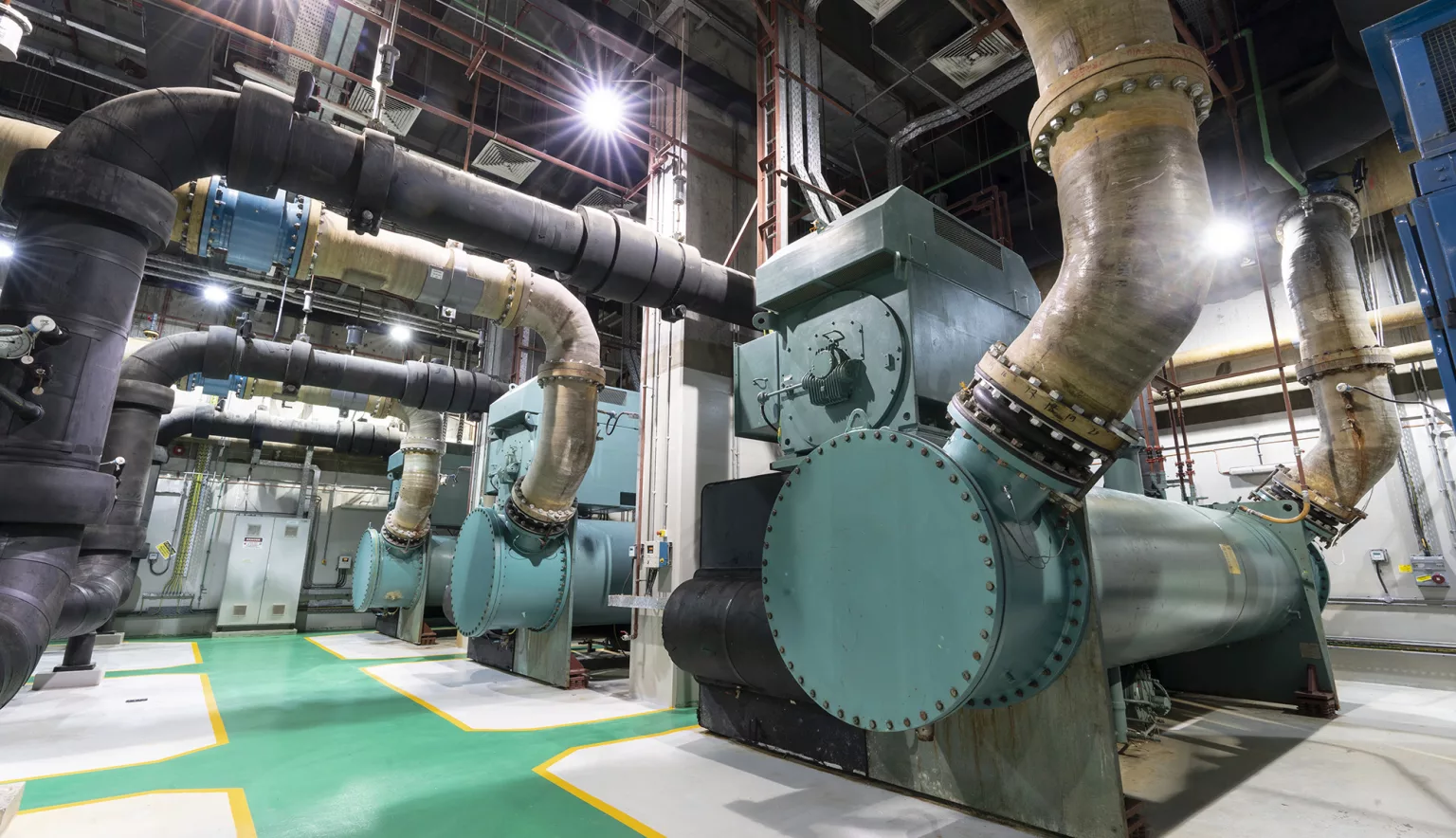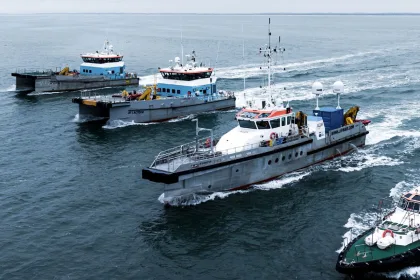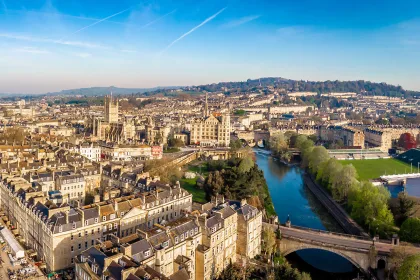Tabreed is showing how district cooling represents a vital cog in the sustainable built environment, its 80-plus plants in the GCC helping to eliminate millions of tonnes of carbon dioxide emissions.
CLEAN COOLING
Rapid urban migration, a warm regional climate and high-density infrastructure developments may seem like three relatively separate, unconnected observations at face value.
Population patterns continue to shift towards urban environments, temperatures in the Middle East are constantly warm versus other parts of the world, and regional governments are investing in large-scale infrastructure to futureproof their economies.
But there is a common denominator – they are all factors contributing to a surge in demand for sustainable district cooling. Globally, by 2021 the market is set to be worth more than $9.5 billion, more than double what it was valued in 2016 ($4.6 billion).
In the GCC region, this presents a tremendous opportunity for leading district cooling specialist Tabreed to make a massive difference to the developmental landscape in a sustainable way.
“With the rapid changes in climate, efficiency is becoming key for effective climate action,” comments Souad Jamal Al Serkal, Tabreed’s VP of Strategic Communications. “We are in charge of the future of our planet and responsible for preserving it for future generations.
“The cooling industry has changed from what it used to be, in light of urban expansion and the major developments in the construction sector, especially in the GCC, and the continuing gradual rise in temperatures globally.
“The sector has had to adapt and evolve in response to these challenges and now plays a major role in developing cities and communities – it has become an ideal solution to achieve sustainability goals. And by some estimates, up to 40 percent of upcoming developments within the GCC are ideally suited for district cooling, representing a colossal opportunity for both Tabreed and the entire industry.”
Al Serkal and the company are determined to place district cooling at the forefront of the sustainable urban development agenda, and it is clear to see why.
For example, it is up to 50 percent more efficient than conventional cooling methods, a figure rising to 70 percent during peak times of activity like factory working hours, busy traffic periods at airports and when high density residential towers are most heavily occupied.
And Tabreed is playing a protagonist’s role. Over the past year, it has helped save 2.06 billion kilowatt hours across the GCC, which is enough energy to power 117,500 homes in the UAE. In carbon terms, this prevented the release of 1.23 million metric tonnes of CO2 into the atmosphere, the equivalent of taking 268,000 vehicles off the road.
STEERING SUSTAINABLE DEVELOPMENT
These already impactful numbers are only set to increase as Tabreed takes on new projects.
“We have established a number of new partnerships with global players in the industry,” adds Al Serkal. “Working towards a more energy-efficient future for Sharjah and delivering the first district cooling solutions for the Emirate, we joined forces with Bee’ah, the Middle East’s leading sustainability pioneer.”
In Masdar City (Abu Dhabi), Tabreed has signed a long-term agreement to acquire the futuristic development’s district cooling plants as it bids to hit its energy efficiency targets.
A world-renowned green city, Masdar is a flagbearer for urban sustainability and also home to some of Abu Dhabi’s most iconic and efficient buildings, including the UAE Space Agency headquarters, MAF Masdar City Center, IRENA HQ and Siemens’ regional head office.
Once expanded, the district cooling plants will provide cooling solutions across more than 2.7 million square metres, operating with a capacity of 69,000 refrigeration tonnes (RT).
“We will also integrate our state-of-the-art AI module control system,” Al Serkal says. “This will adjust the plant’s operating parameters more efficiently and economically to the specific cooling requirements, thus further reducing carbon emissions across the city and beyond.
“In addition to the plant, we will acquire the use of two deep geothermal wells located in Masdar City that are a part of a major research and development collaboration initiative, where we can leverage our sector expertise and innovative approach to create unique, reliable and sustainable cooling solutions through geothermal technology.”
In Bahrain, water from the sea is being utilised to create a district cooling system that is even more sustainable.
“The seawater system is comprised of a 1.5-kilometre intake line from the Manama Lagoon area, a 1.4-kilometre outfall line to Bahrain Bay, a 14-kilometre closed loop chilled water distribution system, and an integrated central supervisory control and data acquisition (SCADA) system to monitor and optimise performance,” explains Al Serkal.
“The closed loop distribution system will enable multiple inter-connected district cooling plants to serve a connected load of 185,000 RT. Currently, the plant serves several major projects including World Trade Centre Tower, Reef Island, the Moda Mall complex and Avenues Mall.”
One of the other sites being served is Bahrain Financial Harbour, 380,000 square metres of prime residential, commercial, retail, leisure and entertainment real estate.
BUILDING TRUST
By continuing to execute on landmark projects across the GCC, Tabreed is not only proving that district cooling works, but that it is a reliable partner for such developments.
It is here that Al Serkal also praises the critical role of its business partners and suppliers, companies which are fundamental to the successful delivery of its own work, with many long-term relationships being built since Tabreed was founded more than 20 years ago.
“Our relationships with our partners and suppliers are a key cornerstone of our ability to provide a reliable, cost effective and efficient service,” she says. “They are chosen because of their excellence and expertise as well as adherence to our high standards of quality and professionalism.
“Tabreed’s reputation as the leading supplier of district cooling in the region has been underpinned by the trust that our partners place in us to deliver innovative cooling solutions, laying a platform for them to achieve their energy efficiency targets.”
Such collaborations will no doubt prove vital in the company’s ongoing efforts to expand its influence across the GCC, Al Serkal also highlighting ambitions to grow outside of the region.
In India, for example, Tabreed has embarked on a 30-year concession agreement to build, own and operate the country’s district cooling systems. With India being a subcontinental superpower, this represents a hugely significant foothold for the company in what is expected to become a prime district cooling market.
This exciting activity, coupled with the traction being gained closer to home as governments embrace sustainable development, leaves Al Serkal optimistic about a bright, clean future.
Citing Tabreed’s strategy for human resources, research, innovation and business development, as well as the aforementioned plans for growth in new and existing markets, she outlines a bold next chapter for the organisation in her concluding comments.
Al Serkal says: “As we broaden our horizons, venturing into exploring geothermal technologies for district cooling and leveraging our existing network to continue growing our portfolio, we are confident in our prospects for 2020 and beyond. As a publicly traded UAE company, being a major player in the district cooling industry on a global stage raises the profile and competitiveness of the UAE.
“The future of district cooling is secure and safe because of the gains it has made over the last few decades, with end users experiencing an improved, efficient and more reliable cooling service which has helped to improve their quality of life.
“District cooling is now being incorporated into national infrastructure strategies, policies, and the development of smart cities within the GCC and around the world as a key component to reducing energy consumption. Tabreed is proud to be a crucial part of a major shift in the attitudes towards energy inefficiencies in the cooling sector, and is prepared for future challenges.”






























